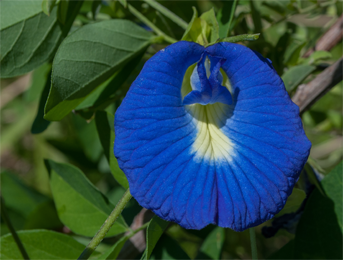Aparajita, Shankupushpam, Butterfly pea (Clitoria Ternatea)

Another very useful herb explained in scriptures of Ayurveda, Aparajita plant is a very beautiful herbaceous plant with many medicinal uses.
It has a very soothing impact on the nervous, circulatory and psychological systems of the body.
Aparajita is commonly known as Koyala in Hindi. The plant belongs to Fabaceae family and its Latin name is “Clitoria ternatea”.
Common Synonyms of Shankupushpam
- English name – Butterfly pea, Clitoria, Mezereon, Winged – leaved
- Hindi name – Koyala
- Sanskrit name – Vishnukranta, Yonipushpa, Girikarnika, Kokilaa
- Bengali Name – Aprajita
- Gujrati Name – Garnee
- Malayalam Name – Shankhapushpam
- Marathi Name – Gokarni
- Tamil Name – Kakkanam
- Telugu Name – Dintena, Sankupushpam
- Unani Name – Mezereon
Occurrence
Aparajita plant or as we know it as Aparajita is an herbaceous, climbing twiner that grows perched on to other plants. It has bright green leaves and bright, blue, lilac or sometimes white colored flowers.
It is sometimes referred to as conch shell as well given its appearance. The plant grows commonly in all parts of India, Egypt, Afghanistan, Persia, Mesopotamia & Iraq etc.
All parts of the plant are used for medicinal purpose for both external as well as internal purpose.
Properties
- GUNA (Characteristics): Laghu (Light), Rooksha (Dry).
- RASA (Taste): Katu (Pungent), Tikta (Bitter), Kashaya (Astringent)
- VIPAKA (After Taste that Develops Post Digestion): Katu (Pungent)
- VIRYA (Potency): Sheeta (Cold Potency)
Special Activity
Aparajita planet is very commonly used in Panchakarma treatments of Ayurveda. These treatments are very effective for balancing doshas in the body and bringing about internal as well as external detoxification.
Because of its impact on the nervous system, it is used to treat many vata vitiated disorders in the body.
Common properties of the Aparajita
- Aparajita is grouped under Medhya herb category in Ayurveda. "Medhya" are herbs which help improve memory and learning. Therefore, it is very good for children suffering from developmental problems of the brain and problems with impaired cognitive function.
- It is also a part of "Shirovirechanopaga" group of herbs described in Ayurveda. That mean it helps in the detoxification and all round cleansing of the brain and its associated structures.
- It is also good for improving voice quality and problems of throat.
- The root of this plant is often used for external application over the skin and it has a very soothing impact over the eyes and helps to improve vision also.
- Aparajita extracts have natural anti – inflammatory properties which make it very useful for combating any kind of inflammation in the body. It relieves indigestion and helps with malabsorption of food in the intestines.
- Fever, diarrhea, gastritis, nausea, vomiting & bleeding from anus are some of the common conditions in which use of Aparajita can come in handy.
- Aparajita is actively used in the Ayurvedic management of mania, schizophrenia & neurological disorders etc.
- It also helps to strengthen the heart and respiratory system.
- This herb also helps to improve the process of spermatogenesis in males and can be a great option for someone struggling with infertility and impotence issues.
- It is a good natural tonic for the blood. The rasa composition helps to purify blood and improve skin conditions like boils, skin outbreaks, acne & pimples etc.
- Even in diseases like small pox, use of Aparajita for external application over the boils can be very effective.
Dosage
Root, bark & seeds are all used in many combinations as per requirement.



